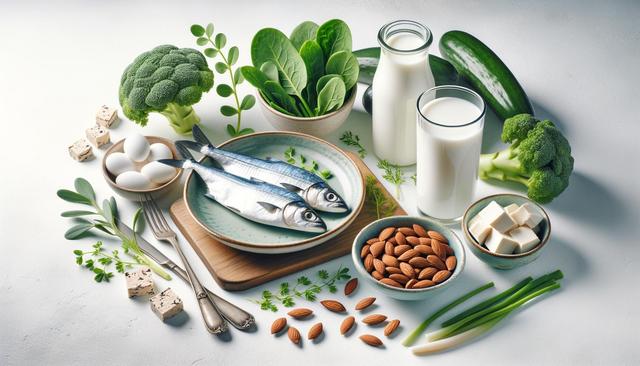Among the Best Diets for Osteoporosis: Foods That Strengthen Bones
Understanding Osteoporosis and Its Impact on Bone Health
Osteoporosis is a condition characterized by weakened bones, making them more susceptible to fractures. It affects millions of individuals worldwide, particularly postmenopausal women and older adults. Understanding the importance of a healthy diet in managing osteoporosis is crucial. A well-rounded diet can help maintain bone density and reduce the risk of fractures. By incorporating key nutrients and foods, individuals can take proactive steps to support their bone health and prevent the onset of osteoporosis. Let’s explore the components of the best diet for bones and how it can contribute to overall well-being.

Calcium-Rich Foods: The Foundation of Strong Bones
Calcium is the cornerstone of any bone-friendly diet. Essential for maintaining bone structure, calcium-rich foods should be a staple in your daily meals. Dairy products such as milk, cheese, and yogurt are traditional sources of calcium. However, for those who are lactose intolerant or prefer plant-based options, there are plenty of alternatives. Leafy green vegetables like kale and broccoli, as well as fortified plant-based milks, offer excellent sources of calcium. By ensuring a consistent intake of calcium, you are laying the foundation for healthy bones.
Vitamin D: Enhancing Calcium Absorption
While calcium is vital, it’s equally important to ensure that your body can effectively absorb it. This is where vitamin D comes into play. Vitamin D facilitates the absorption of calcium in the gut, making it an essential component of a bone-friendly diet. Sunlight is a natural source of vitamin D, but it can also be obtained from foods such as fatty fish, egg yolks, and fortified cereals. Including these foods in your diet can help you maintain optimal levels of vitamin D, ensuring that your body can make the most of the calcium you consume.
Protein: Building Blocks for Bone Health
Protein plays a significant role in maintaining bone density and strength. It provides the necessary building blocks for bone tissue and supports muscle health, which is vital for preventing falls and fractures. Incorporating lean proteins such as poultry, fish, beans, and lentils into your diet can contribute to a well-rounded approach to bone health. Additionally, some studies suggest that consuming adequate protein may help increase the production of hormones that support bone growth, making it a crucial element of a healthy bones diet.
Magnesium and Zinc: Supporting Bone Structure
Magnesium and zinc are two minerals that often fly under the radar but are essential for bone health. Magnesium helps convert vitamin D into its active form, which aids in calcium absorption. Meanwhile, zinc plays a role in bone formation and repair. Foods such as nuts, seeds, whole grains, and legumes are excellent sources of these minerals. By including a variety of these foods in your meals, you can ensure a balanced intake of magnesium and zinc, thereby supporting your overall bone structure.
Adopting a Comprehensive Bone-Friendly Diet
To effectively eat right for bones, it’s important to adopt a comprehensive approach that includes a variety of nutrients. A bone-friendly diet is not just about focusing on a single nutrient but rather a combination of foods that work together to strengthen and maintain bone health. Consider incorporating the following into your daily meals:
- Dairy or fortified plant-based milk for calcium
- Fatty fish or fortified cereals for vitamin D
- Lean proteins like poultry and beans
- Nuts and seeds for magnesium and zinc
- Leafy greens for additional calcium and other nutrients
By exploring a bone-friendly diet and making informed food choices, you can take significant steps toward preventing osteoporosis and enjoying healthy bones for years to come.
